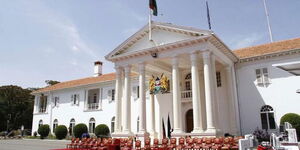An African Development Bank (AfDB) report has revealed that Kenya loses at least Ksh297 billion to corruption, tax exemptions and public spending inefficiencies.
Published on Wednesday, July 2, the report claimed that $1.5 billion (about Ksh193 billion in the current exchange rates) was lost annually through corruption and illicit financial flows. These funds alone could transform health, education, and infrastructure development.
A further $800 million (Ksh103 billion in the current exchange rates) loss is attributed to tax exemptions and incentives across several sectors, and public spending inefficiencies cost another 5 per cent of gross domestic product.
“Combined, these losses undermine Kenya’s capacity to finance its development and reduce reliance on external aid,” AfDB stated.
According to the African lender, Kenya, therefore, needs to tackle corruption and the political influence on the state's decisions in order to recover its economy.
State capture, which involves political elites dominating lawmaking and enforcement, was also cited as a vice subverting the rule of law and creating uncertainty, which in turn curtails investment and capital mobilisation.
This common practice, AfDB noted, tends to push investors away, as investors often seek to set up in regimes with a more stable and transparent legal framework.
“Investors fear biased rulings, delays, and lack of transparency, increasing operational risks and deterring investment,” it said.
“Ultimately, the rule of law, upheld by robust law enforcement and an independent judiciary, remains the foundation for sustained economic growth, social equity, and public trust in governance.”
Unfortunately, Kenya does not tick the transparency box, ranking in the bottom third of Transparency International’s global corruption perception index in 2024.
Despite this, AfDB projected that Kenya’s economic growth is set to accelerate to 5 per cent this year from 4.7 per cent in 2024. This projected growth is to be powered by agriculture and services.
However, poverty fuelled by high unemployment and inequality could slow the economic growth to 4.8 per cent in 2026, according to the bank.












